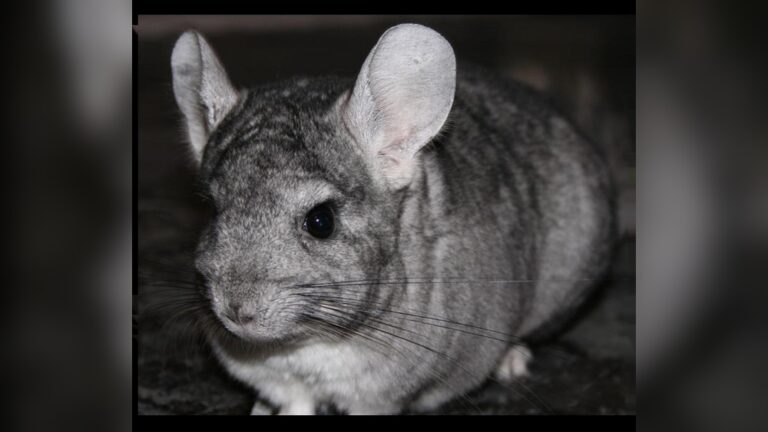Why Do Chinchillas Make Noises: Surprising Sounds Explained
Have you ever wondered why your chinchilla suddenly makes strange noises? Those little sounds can tell you a lot about how your furry friend is feeling.
Whether it’s a soft squeak or a loud bark, each noise has a meaning you don’t want to miss. Understanding these sounds can help you connect better with your chinchilla and keep it happy and healthy. Keep reading to discover the surprising reasons behind your chinchilla’s noises and what they mean for you and your pet.

Credit: cuddlebugchinchillas.com
Common Chinchilla Sounds
Chinchillas communicate using a variety of sounds. These noises help them express feelings and needs. Understanding these sounds helps owners connect better with their pets. Each sound has a meaning tied to their mood or situation.
Chinchillas use both vocal sounds and body language to share messages. Recognizing these signals can improve care and bonding.
Types Of Vocalizations
Chinchillas make several common sounds. A soft “chirp” shows curiosity or happiness. A loud “bark” warns of danger or fear. They may also squeak when feeling stressed or excited. Gentle “coos” often mean contentment. Each sound varies in pitch and length.
Body Language And Sounds
Sounds often pair with body movements. A chinchilla may puff up while making alarm sounds. Quick tail flicks might show irritation. Calm, relaxed postures usually come with soft noises. Watching body language helps interpret vocal signals better. This combination reveals the pet’s true feelings.
Reasons Behind Chinchilla Noises
Chinchillas are small, quiet animals, but they do make noises. These sounds have different meanings. Understanding why chinchillas make noises helps build a better bond. It also keeps your pet happy and safe.
Communication With Owners
Chinchillas use sounds to talk to their owners. They may make soft chirps or squeaks. These noises show they want attention or food. Sometimes, they make gentle noises when they feel calm. It is their way to say, “I am here.”
Expressing Emotions
Chinchillas show feelings through sounds. A happy chinchilla might purr softly. If they feel scared, they may squeal loudly. Anger or frustration can cause sharp noises. These sounds help owners understand their pet’s mood.
Warning And Alarm Calls
Chinchillas use loud noises to warn danger. A sudden loud scream means they are very scared. It alerts other chinchillas and owners about threats. These alarm calls help protect them in the wild or at home.
Surprising Chinchilla Sounds
Chinchillas are quiet creatures most of the time. Yet, they make many different sounds. These noises show their feelings and needs. Understanding these sounds helps you care better for your pet. Some sounds are common, but others can surprise you.
Knowing why chinchillas make these noises helps you respond the right way. Each sound has a meaning. You can tell if your chinchilla is happy, scared, or upset. Let’s explore some unusual and rare chinchilla sounds.
Unusual Noises And Their Meanings
Chinchillas often make a soft “bark” sound. It can mean they feel scared or warn you to stay away. Another unusual noise is a low “grunt.” This shows they are annoyed or uncomfortable.
Sometimes, chinchillas make a clicking sound with their teeth. This usually means they are happy or relaxed. It is like a gentle purr in cats. Listening to these sounds helps you understand your pet’s mood.
Rare Vocal Behaviors
Rare sounds include a high-pitched scream. This scream means extreme fear or pain. It is a clear signal to check on your chinchilla quickly. Another rare sound is a soft “chirp.” This may happen when a chinchilla feels curious or playful.
Chinchillas may also make a quiet “whistle.” It is not common but shows they want attention. These rare noises offer clues about their health and emotions. Paying attention to them improves your bond.

Credit: www.youtube.com
How To Respond To Chinchilla Sounds
Responding to your chinchilla’s sounds helps build trust and care. Their noises tell you what they feel or need. Understanding these sounds leads to better care and a happy pet.
Identifying Needs And Concerns
Chinchillas make different sounds for various reasons. A soft chirp may show contentment or curiosity. Loud squeaks often signal fear or pain. Pay attention to changes in their usual sounds. These changes can mean stress or illness. React quickly to urgent sounds like loud screams. Quiet whining may mean hunger or thirst. Knowing these sounds helps you meet their needs fast.
Improving Interaction
Responding to your chinchilla’s sounds improves your bond. Speak softly to calm them when they are scared. Offer treats if they make happy noises. Avoid loud noises that frighten them. Spend time near their cage to learn their language. Gentle petting after calming sounds builds comfort. Your chinchilla will feel safer and more relaxed. This trust makes handling and playtime easier.
Preventing Stress-related Noises
Chinchillas make noises to show stress or discomfort. Preventing these noises helps keep them calm and happy. Stress can cause chinchillas to vocalize in ways that might seem alarming. Reducing stress improves their health and strengthens your bond.
Creating A Comfortable Environment
Chinchillas need a quiet and safe space. Loud sounds and sudden movements scare them. Keep their cage in a calm room away from noise. Provide soft bedding and enough space to move around. Proper temperature is important. Too hot or cold makes them uneasy. A clean, tidy cage reduces stress and unwanted noises.
Handling And Care Tips
Handle chinchillas gently and with care. Sudden grabbing or rough play causes stress noises. Spend time getting them used to your touch slowly. Offer treats to build trust. Avoid loud voices or fast movements near them. Regular feeding times help them feel secure. Watch for signs of stress like biting or running away. Calm, patient handling lowers stress sounds greatly.

Credit: www.youtube.com
How Smart Pets Lover Can Help You with Why Do Chinchillas Make Noises
Turning Chinchilla Noises into Learning Moments
Understanding why your chinchilla makes noises opens up a wonderful chance to deepen your bond while learning about their unique behavior. As we’ve explored, common chinchilla sounds often reflect their mood or needs, while surprising noises might signal stress or excitement. By paying close attention to these vocal cues, you can respond thoughtfully—whether it’s soothing a scared chinchilla or celebrating playful chatter.
These moments become practical learning opportunities, teaching you to recognize subtle signals and promote your pet’s well-being. It’s like becoming fluent in their language, fostering a trusting relationship that goes beyond basic care. At Smart Pets Lover, we believe every chirp or squeak tells a story worth understanding—helping pet parents feel confident and connected.
- Observe patterns in your chinchilla’s sounds to identify emotional states.
- Use gentle responses to prevent stress-related noises and encourage calm behavior.
- Document unusual sounds and share insights with a vet or pet community for guidance.
If you ever feel unsure, reaching out to experienced chinchilla caretakers or local vets can provide valuable advice tailored to your pet’s needs. Remember, every sound your chinchilla makes is a step toward a deeper, more joyful friendship.
Frequently Asked Questions
Why Do Chinchillas Make Noises?
Chinchillas make noises to communicate emotions like stress, excitement, or warning. Their sounds help them express needs and alert others.
What Types Of Noises Do Chinchillas Produce?
They produce squeaks, grunts, and chirps. Each sound has a different meaning, such as alert, contentment, or distress.
When Do Chinchillas Usually Vocalize?
Chinchillas vocalize mostly during social interactions, stress, or discomfort. They may also make noises when exploring or feeling threatened.
Can Chinchilla Noises Indicate Health Issues?
Yes, unusual or excessive noises can signal pain or illness. Monitoring sounds helps detect health problems early for timely care.
Conclusion
Chinchillas make noises to share their feelings and needs. These sounds help them talk to other chinchillas and their owners. Understanding their noises builds trust and improves care. Every noise has a meaning, so listen carefully. Paying attention keeps your pet happy and healthy.
Enjoy the unique ways chinchillas communicate. They are more than just quiet pets. Knowing their sounds brings you closer to them. Keep learning about your chinchilla’s voice every day. It makes your bond stronger and life better.






